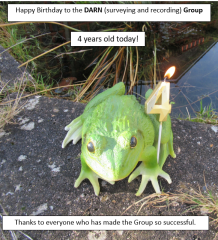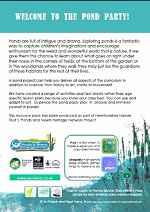About us
About Us
DARN is a network of people in Dorset interested in our native reptiles and amphibians. Its purpose is to promote the conservation, recording and appreciation of native amphibians and reptiles in the county of Dorset. DARN serves as a means of communication between volunteers, professionals and the general public. DARN members pay an annual fee of £6 and then when suitably trained they can take part in our widespread reptile surveys. These can be viewed once reptile surveyor status has been achieved. DARN is also running the SliC project - Slow-worms in Churchyards. We have rare reptile survey sites on FE and MOD land and we are continually adding new transects as we expand our activities across the county. DARN also monitors non-native species to try to assess any impact on our native species.
Dorset has 12 of the UK's 13 native amphibian and reptile species, and a handful of non-native species. Its internationally-important heathlands are famous as national strongholds for the rare reptiles - Sand Lizard and Smooth Snake - and southwest England's only populations of our second-rarest amphibian, the Natterjack Toad. With such an important wildlife heritage in Dorset, several wildlife NGOs have their headquarters in the county, including the Amphibian and Reptile Conservation Trust (ARC). Together with the various statutory bodies and local authorities, this means Dorset has many wildlife professionals. DARN aims to form a link between all these people, and to nurture an appreciation among the general public for our herpetofaunal friends.
Sheila Dyason is Chair of DARN. DARN Dispatches is a newsletter that is produced at least twice a year, telling you of news, items of interest, and projects to get involved in. Dorset is home to some of the most important reptile and amphibian populations in the country, with a high concentration of protected sites, conservation activities and research projects. There are endless opportunities for helping out by volunteering, and there are already many volunteers in the county who give their time towards projects helping to conserve our herpetofauna, and raise awareness.
The History of the DARN Group
DARN was set up as a surveying and recording group on 30/01/2020. Previously it had been an email and facebook group.
The founding members were Sheila Dyason as Chair, Catherine Dyason as Secretary, Pete Gillatt as Treasurer.
The Group started with rare reptile sites which Sheila had arranged with Forestry England to survey as part of HIWARG – the Hampshire Group. Some of them had been set up and monitored by David Tamarind who sadly died recently. There were not any widespread species surveys for members to get involved with so Sheila set up the SliC Project – Slow-worms in Churchyards - as a way to get members involved in surveying.
As of July 2021 DARN has 8 widespread reptile transects set up in north Dorset and three more rare reptile transects including one on MOD land. DARN is working with land owners and managers such as Forestry England, Butterfly Conservation, the Dorset Wildlife Trust, the MOD, church communities and private land owners.
News
News
DARN Dispatches 18
DARN Dispatches 18
Thanks to everyone who is currently carrying out reptile surveys for DARN. It is always exciting to lift a tile and see what is underneath.
Habitat management was a great success; although looking at the bracken that has been shooting up in the last few weeks it is hard to believe. At least the trees don’t regrow as fast.
Forestry England have appointed a Wildlife Ranger for North Hampshire but they are readvertising for the Ringwood area.
New water bodies have been created near and in Ringwood Forest. A steep sided gravel pit is attracting birds and dragonflies. A small strip of reptile fencing remains in place but as it is so short any reptiles can easily go around it. The site is fenced off with barbed wire and planted with hawthorn and blackthorn hedging. Hopefully once the vegetation gets established and the banks stabilise some access will be allowed. There is a small meadow strip between the pit and the forest track that is alive with insects at the moment.
A second site that is currently being created has a shallower edge. It is fenced off and there is a warning notice about quicksand at one end. Birds are already using it and once the vegetation grows it could be a good amphibian site.
One of the original ponds had 50 – 100 clumps of frog spawn this year. Hopefully the Frogs managed to develop before this section of the pond dried up.
We have just counted the reptile records for May 2025 that have been recorded by our surveyors during their monthly site visits:
104 Slow-worms
34 Common Lizards
17 Sand Lizards
9 Smooth Snakes
14 Adders
15 Grass Snakes
7 Wall Lizards
There will also be casual records and sightings by members of the public on Record Pool. So well done everyone!
As usual casual sightings of amphibians and reptiles can be added to Casual Sightings on the DARN website: www.groups.arguk.org/darn or on Record Pool: www.recordpool.org.uk. Historic records are fine as well.
We look forward to hearing from you.
Keep safe!
Sheila Dyason and Cathy Dyason
Chair of DARN Secretary of DARN
Conservation opportunities for everyone!
DARN Dispatches 17
* Habitat management has been progressing well – when the weather permits. Our tree work last year has made it quicker and easier to clear the bracken and regen. Thanks to everyone for their help.
* 24 Palmate Newts were seen in the Alderholt garden ponds (11/12/2024) one hour after sunset. All 4 ponds were occupied with 10 gathered in a group in the larger pond.
* Thanks especially to Cathy, Tina, Larry and Paul for your surveying efforts over the year. The 15 Smooth Snakes tally found by Paul was impressive.
* Frogs have been seen crossing roads on their way to their wintering sites.
* Wall Lizards are still being recorded on Bournemouth Cliffs (December).
* There are still some issues with ARGWEB but most are manageable.
As usual casual sightings of amphibians and reptiles can be added to Casual Sightings on the DARN website: www.groups.arguk.org/darn or on Record Pool: www.recordpool.org.uk. Historic records are fine as well.
We look forward to hearing from you.
Keep safe!
HAPPY CHRISTMAS to all our members
Sheila Dyason and Cathy Dyason
Chair of DARN Secretary of DARN
Conservation opportunities for everyone!
DARN Dispatches 16
DARN Dispatches 16
Thanks to everyone who has carried out reptile surveys over the spring and summer. It has been a hectic few months.
There are lots of juvenile reptiles and amphibians about at the moment. Gardening is difficult as the compost bin is full of Slow-worms; there are Grass Snakes under the hedge, tiny Frogs leap out when we try to weed a flower bed; Palmate Newts are in the soil and under rocks and tiles. The only ones missing are the Toads. No sign of them since breeding began.
Congratulations to Larry for being awarded his Natural England Rare Reptile licence. He has completed lots of surveys and added numerous records to the DARN and HIWARG databases over the last two years so it was well deserved.
Habitat management will be starting again in a few weeks. The bracken we cleared last year has regrown but not as tall as before and more sparsely which will make this year’s clearance a lot easier. The heather and gorse are looking beautiful and many walkers have commented on it.
We still have not heard if a new Forestry England Wildlife Range has been appointed but it does not affect our surveys or habitat management. It is just good to keep in touch.
As usual casual sightings of amphibians and reptiles can be added to Casual Sightings on the DARN website: www.groups.arguk.org/darn or on Record Pool: www.recordpool.org.uk. Historic records are fine as well.
We look forward to hearing from you.
Keep safe!
Sheila Dyason and Cathy Dyason
Chair of DARN Secretary of DARN
Conservation opportunities for everyone!
Happy 4th Birthday to the DARN Group

DARN Dispatches 15
DARN Dispatches 15
We are halfway through January already so a bit late to say ‘Happy New Year’. The weather has been fairly kind to Dorset so far. Mild and windy before Christmas but it did allow for plenty of habitat management opportunities. Bracken clearing has been the main focus at one site. Where the bracken has been left for a few years without management the heather is still fairly healthy underneath but where the bracken has not been managed for 6-8 years the ground is basically bare underneath once the dead bracken has been removed. Hopefully heather seeds have remained viable in the soil and will soon germinate. Habitat management is continuing but with the milder weather continuing we are also looking out for reptiles enjoying a bit of warmth in more sheltered areas.
Newts and Frogs are already arriving in ponds throughout the county and in our garden ponds. We have not heard of any Toad sightings yet. We wonder who will report the first spawn clumps of 2024.
Congratulations to Tina and Paul for being awarded their Natural England Rare Reptile licences. They have both completed lots of surveys and added numerous records to the DARN and HIWARG databases so they were well deserved. Two more DARN members are working towards their licences as well.
BBC’s Winterwatch starts tomorrow and is being broadcast from Arne so it will be interesting to see if the Team find any amphibians or reptiles on their wanderings.
As usual casual sightings of amphibians and reptiles can be added to Casual Sightings on the DARN website: www.groups.arguk.org/darn or on Record Pool: www.recordpool.org.uk. Historic records are fine as well.
We look forward to hearing from you.
Keep safe!
Sheila Dyason and Cathy Dyason
Chair of DARN Secretary of DARN
Conservation opportunities for everyone!
Events
Events
Past Events
Show Upcoming EventsTurbary Common sand patch digging
Sat 14th May, 2011
Turbary Common's sand lizard population has been declining steadily for years, due to the lack of bare sand available for egg-laying. Over time, vegetation grows over bare ground patches, and wind winnows away sand to leave a gravel lag that is too hard for sand lizards to dig through. We aim to dig lots of small bare ground patches about 1x1m, within the heather, using garden tools (fork, spade, mattock etc), to aid breeding success. Female sand lizards lay their eggs in burrows about 10-15cm (4-6 inches) deep, around the end of May/early June, in bare patches of sand in sunny positions.
This DARN event is open to all. Meet 9.00am, main entrance gate on Turbary Park Avenue. We should finish around 1.00pm. Some of us may break for refreshment locally, and then carry on a while if we are still able. Please wear stout footwear, old clothes, bring spade etc if possible, and be prepared for some physical activity. We look forward to seeing you on the 14th. This task should bring quick results, we hope, with immediate benefits to the sand lizard population.
ARG UK SW England regional meeting in Exeter
Sat 10th December, 2011
After last year's excellent conference in Somerset, the SW England regional ARG UK meeting this year is being hosted by Devon Reptile and Amphibian Group. The programme and booking form are now available. The price for registration including lunch is £20 for ARG members/unwaged, or £35 for all others. Details from devonrag@hotmail.com.
Herpetofuana Workers Meeting 2013
Sat 26th January, 2013
The annual Herp Workers Meeting - the highlight of the herpetologist's social calendar - (25),26,27 January 2013.
The HWM has been established for over 25 years, and this unique and popular event occupies the centre stage of the herpetological calendar, attracting a broad range of participants from across the UK including volunteers, professional ecologists, statutory nature conservationists, students & academics.
The programme is almost ready for next year's meeting which will be at the Edinburgh Conference Centre at Heriot-Watt University on the Saturday 26 & Sunday 27 January 2013 (with social activity starting on Friday 25 Jan). Various topics will be discussed through presentations and workshops. Here is a sneak preview:
- Life on the edge? - Current status of UK adders
- Turbulent times for tartan natterjacks?
- Survey and mitigation practices for GCNs
- The impact of chytrid - in the UK and overseas
- Reconnecting dragons in Wales
- The Glasgow living waters project
Flyer and booking form here: http://www.arguk.org/download-document/171-herpetofauna-workers-meeting-2013-booking-form-programme
GCN training, Leeson House, Purbeck
Sat 27th April, 2013
There will be a DARN great crested newt training evening on Saturday 27th April 2013, 7.00-10.30pm.
Location: Leeson House (National Trust), Langton Matravers, Swanage, Dorset BH19 3EU - www.leesonhouse.com
Order of the evening:
1900-1930 – Powerpoint presentation on GCN biology, ecology & survey techniques
1930-2000 – Egg-searching (& netting if no risk of turbidity), Leeson House pond
2000-2130 – Break to wait for dark (pub meal for those interested)
2130-2230 - Torchlight survey, Leeson House pond (moving on to Green Pool BHS/ARC reserve if necessary and/or sufficient interest).
If you have a good pond net and/or a powerful torch, bring them along. Any assistance from experienced newters welcome too. Bring suitable clothing for the weather, and ideally wellies on your feet. I’ll need you to sign a DARN membership form for insurance purposes.
Contact Chris Gleed-Owen chris@cgoecology.com if you plan to attend. Ideally numbers won’t exceed a dozen or so.
GCN training
Sat 27th April, 2013
Great crested newt training evening at Leeson House (Dorset County Council residential field centre), Langton Matravers, Swanage, Dorset BH19 3EU - www.leesonhouse.com - Saturday 27th April 2013, 7pm until 10.30pm approximately.
Order of the evening:
1900-1930 – Powerpoint presentation on GCN biology, ecology & survey techniques, Leeson House
1930-2000 – Egg-searching (& netting if no risk of turbidity), Leeson House pond
2000-2115 – Break to wait for dark (pub meal in The Ship Inn for those interested)
2115-2230 - Torchlight survey, Leeson House pond, and moving on to Green Pool, Norden (BHS/ARC reserve) if necessary and/or sufficient interest.
If you have a good pond net and/or a powerful torch, bring them along. Any assistance from experienced newters welcome too. Bring suitable clothing for the weather, and ideally wellies on your feet. I’ll need you to sign a DARN membership form for insurance purposes.
Informal DARN meeting to discuss plans for the year
Tue 11th February, 2020
7:30 pm at the Bakers Arms, Poole. An informal chat to introduce Sheila to DARN members and to discuss plans and actions for the coming year.
Join up or Log in
Join up or Log in
Info & ID guides
Info & ID guides
Herp Identification - downloadable colour charts
Amphibian Identification - downloadable colour cards
Reptile Identification - downloadable colour cards
Newt Eggs & Larvae - downloadable colour cards
![]() Its_a_small_newt_but_which_one_1.pdf
Its_a_small_newt_but_which_one_1.pdf
Dogs & Adders - downloadable advice sheet.
Improving Herp habitat
Creating Garden Ponds - downloadable booklet
ARGWEB Tutorials
![]() ARGWEB Pond Survey Recording Guide
ARGWEB Pond Survey Recording Guide
![]() ARGWEB Reptile Transect Survey Guide
ARGWEB Reptile Transect Survey Guide
Types of Sightings typically recorded on ARGWEB
How to record a transect survey data
Herp diseases - recognise & report
Snake Fungal Disease
Toad fly (Lucilia bufonivora)
Amphibian Chytridiomycosis
Ranavirus Disease
Reptile Slough Genebank - collection & submission of found sloughs
Other
Useful glossary of terms often used within the herpetological field. (Credit due - unknown)
Kids stuff - Educational items for the young ones
Pond pack 
Photo gallery
Photo Gallery
Upcoming Events
Upcoming events will be listed here.
Latest News
- DARN Dispatches 18
03/06/2025 7:43 pm - DARN Dispatches 17
12/12/2024 1:47 pm - DARN Dispatches 16
18/08/2024 7:19 pm - Happy 4th Birthday to the DARN Group
30/01/2024 7:50 pm - DARN Dispatches 15
15/01/2024 7:41 pm
© Dorset Amphibian and Reptile Network (DARN)
Website hits: 66911
View All | Find out how to get a mini-website for your ARG
© ARG UK Local Groups mini-websites 2025
Wind powered websites by Aye-aye Design.
